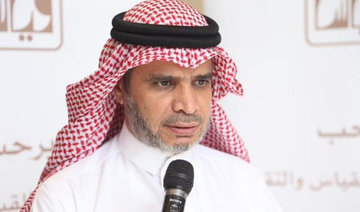DUBAI: As consumers across the region become more cost-conscious and less brand-loyal, purchasing behaviors are changing, with online shopping taking center-stage.
And with Black Friday sales growing 1,250 percent compared to a regular Friday in countries such as Saudi Arabia, according to recent research, this year’s occasion is expected to bring a surge in online buyers.
“It’s very clear that today’s shoppers have become accustomed to doing their own research to get the maximum value out of every penny they spend,” said Sarah Jones, founder of Sprii, an online shopping destination for mothers based in the region. “They are using online channels to compare prices and products and to shop the widest range of products from one particular vertical or brand. Physical stores provide a viewing platform to touch, see and experience the product, however online destinations are more and more becoming the place where shoppers are transacting.”
As logistics companies develop, payment gateways become more trusted and online interfaces become more advanced, the shift to online is expected to continue. “The crash in oil prices has had a trickle-down impact on the Gulf’s retail markets, leading to a fall in consumer confidence,” Jones said. “This, alongside the introduction of VAT and rising interest rates, have all had an impact. Approximately 55 percent of consumers are now actively looking for savings across markets and are tightening their belts, and retailers are feeling the impact.”
Research by Black-Friday.Global, which surveyed 12,000 people from 55 countries, found that 45 percent of Saudis will participate in Black Friday this year, spending on average 899 riyals, with the most popular items reported as being clothes, electronics and shoes.

“Today, consumer habits are definitely being reformed by the convenience and prevalence of online shopping options, which offer an enormous wealth of brands from all over the world,” said Mohammed Baker, deputy chairman and CEO of Gulf Marketing Group. “To avoid losing ground to other innovative retail capitals, Gulf retailers – especially those with physical storefronts – need to go above and beyond the expectations of customers by concentrating on exceptional service, personalization and shopping spaces.”
He said stocking the latest, most fashionable must-have items was a priority for the region’s physical retailers over the past decade. However, as a result of economic globalization and the rise of online shopping, a course change is under way as retailers refocus on the customer experience.
“That experience is the real determinant of business success – whether you’re an online brand, a brick and mortar shop, or both,” Baker explained. “Whether it is online or offline, service plays an undeniable role in creating memorable customer experiences. Going the extra mile and training your employees to deliver to the highest service standards will help retailers secure loyalty and maintain a competitive edge.”
Gulf retailers need to go beyond customer expectations to offer exceptional service and personalization
He gave the example of a new generation of customer relationship management solutions that are paving the way for more personalized retail journeys. With real-time insight into customers’ preferences, purchasing habits, interest in promotions and others, retailers are able to create a single, consistent brand experience across physical and digital touch points. “One edge that local brick and mortar retailers have over e-commerce is that they can deliver a physical experience not yet possible through digital channels,” he added.
“The physical environment has an enormous impact on the way that your customer feels and interacts with your merchandise. We’re going to see a lot more emphasis in the future on how lighting, sounds, textures and scents can bring people from a busy shopping mall, for example, into your own unique retail experience.”
The emergence of the online market in recent years, accompanying the rise of the Internet as a trend, has led to a complete shift in buying habits, methods and routines of customers that can be attributed to a variety of reasons.
“Naturally, more and more consumers love the idea of going shopping without actually having to go anywhere,” said Lucas Jiang, general manager of TP-Link MEA FZE, which provides cloud solutions. “The convenience of it all, be it the cashless payments, easy returns, reverse pick-ups or just the ability to shop from your couch, is driving consumer shopping online and rapidly so, creating more disruption in the retail industry.”
In the future, Jiang expects technology to bridge the gap between online and offline shopping in the region, to eventually merge into a unique eco-system where retailers will have an extensive online presence, and e-commerce portals will get on the ground to give physicality to their brands. “Robotics and the Internet of Things will play a crucial role in shaping the way the retail world changes,” he said. “Consumer behavior is continuously evolving, and the way consumers interact with retailers is rapidly changing. Technology needs to be leveraged to design consumer experiences that integrate the offerings of a retail store as well as an e-commerce portal.”
Narendra Menon, managing director of Nikon ME, said the trend of shopping has changed drastically in the last five years, with consumers becoming increasingly aware and prudent about their purchases. “People are also conscious about their income, thus more measured decisions have started to take place,” he said. “They have become smarter and like to make well-informed purchase decisions. Things that drove consumers earlier, like advertisements and in-store sales talk, don’t work anymore – they like doing their own homework and research, mostly online, and they really seem to enjoy this new, extended purchase journey.”
This type of shopping gives consumers more control over their decisions, along with convenience. Heavy discount sales, such as the ones witnessed on Black Friday, have also become a trend, giving brands the opportunity to launch new items at a time when they can reach the most consumers. “With the changing fundamentals of brick and mortar and phenomenal growth of e-commerce, the trend of sales has changed,” Menon said. “Though e-commerce is still growing, it is yet to settle in the Gulf region. It is imperative to understand that the countries in the Gulf are mostly cash-driven and the consumers have yet not entirely been able to place their trust in the e-commerce system.”
There are many obstacles still to face, Menon pointed out. “The last-mile delivery is still an issue in this region as the addresses are not unified yet, and the preference of cash-on-delivery as a payment method instead of online payment has its own challenges as well.”
While e-commerce will continue to grow, Menon said a physical address will always have value in the region.

“Malls are a part of the lifestyle in Gulf countries. Even in Saudi Arabia, the number of new malls is increasing and opening a path for ground retailers to tap into every consumer.”
He spoke of retailers trying to enhance the experience they offer customers with the use of the latest technology, such as virtual screens that help consumers pick their outfit color. “More such innovations through artificial intelligence are about to happen,” he said. “It will be interesting to see how the whole dynamics pan out.”
With consumer choice on the rise, the experiential part of retail is said to have seen the largest improvement, whether online or in a store. “That is the only way to get a share of the customer’s wallet,” said Ashish Panjabi, chief operating officer for Jacky’s Retail LLC. “Retail overall has undergone several changes, some of it caused by online shopping but also by the way retail dynamics in the region operate. With a lot of brands, retail formats and retail real estate, retailers have had to do overall a lot more to win over a consumer.”
He said consumers are always going to expect more, and “it is our job as retailers to deliver more. For a retailer, the investment cycle will continue to accelerate and for most consumers, they will reach a stage where the better experience at the right price eventually wins their business.”





























